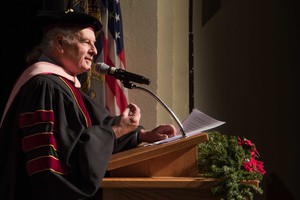Commencement speakers offer career and personal counsel to graduates

CHADRON – Two Chadron State College professors, Dr. G.W. Sandy Schaefer and Bruce Hoem, spoke during winter commencement ceremonies Friday.
Ninety graduate students received their degrees in Memorial Hall. The ceremony was opened with a moment of reflection by Sheyenne Sandstrom of Yuma, Colorado. Austen Stephens of Lincoln, Nebraska, offered the closing moment of reflection.
The undergraduate ceremony was comprised of 144 candidates. The opening moment of reflection by Heather Ong of Singapore and Alyssa Sanders of Dalton, Nebraska, provided the closing reflection. Also two Army ROTC cadets, Megan McLean of Brewster, Nebraska, and Major Armstead of Granada Hills, California, were commissioned as second lieutenants.
In the graduate address, Schaefer, professor of Music, commended the graduates for completing their degrees and encouraged them to continue exhibiting the self-starting drive that helped them graduate and encouraged them to fill future leadership roles.
“In many cases, you only need to express your willingness to help and those leadership opportunities will open magically before you. You just need to show up,” he said.
He shared another key to leadership he recalled from a business session at a National Association of Music Merchants convention more than a decade ago.
“To establish a good working relationship you must make people feel good about themselves when they are with you. It is really pretty simple. You don’t have to lie to people, you just have to make them feel comfortable around you,” Schaefer said. “This advice struck a chord in me. In fact, it is part of the Golden Rule.”
Building rapport with others will allow for honest but kind criticism, Schaefer said.
Schaefer urged the graduates to introduce themselves to others in their fields and not shy away from networking. He cited an example from his life when he missed an opportunity to know an educational director of a major drum company for several decades.
Schaefer said he overlooked the drum expert because he worked in a music store in Schaefer’s hometown, rather than the well-known drum shop in downtown Chicago where he made his purchases.
“For whatever reason, I did not reach out and speak to him. If I had, I would have had a friend in the music industry for over 40 years. Over 40 years of wasted time. This mistake didn’t stop me in my career, but it would have been much richer with his friendship,” Schaefer said.
Hoem, professor of Counseling, Psychology and Social Work, addressed CSC’s undergraduate candidates in the Chicoine Center. Hoem’s speech encouraged them to reject the tendency to be jaded but to consider compassion.
In response to one of his student’s comments about feelings of anger and fear after the recent presidential election, Hoem shared a story focused on a wounded cat he found on a Wyoming highway 40 years ago. The life changing encounter came after he had returned from service in the Vietnam War.
“It was not my desire to go to Vietnam. I really only wanted to remain a cowboy for the rest of my life. That was my desire. There was nothing I liked more than riding a fast quarter horse through the Wyoming sagebrush, chasing back calves that had strayed from the herd we were moving to summer pasture in the mountains,” Hoem said.
He said his fear in Vietnam came not from the daily possibility of dying, but from pondering his country’s involvement. He said his Wyoming memories began to fade and it seemed like he would be in Vietnam forever.
When he returned, he wrote numerous stories and poems as part of his personal campaign to inform and convince others about the follies of war. His writings led to a suggestion he should attend college.
“How could I ever go to college? I only knew that colleges existed, and if you were smart enough, you could somehow go to college. I had never been on a college campus. And a college campus was a place where I believed I might not be welcomed. I was no longer a soldier, but I was a lot closer to being a soldier than I was to being a student,” Hoem said.
His decision to enroll at a community college was followed by the relentless question that had followed him home from Vietnam.
“How do we abolish the evil that rears its ugly head in so many places and so often on our earth? Which of my teachers was going to answer that question for me? Six, eight, and even 10 years of education before they came into the classroom, and none of them had the answer,” Hoem said.
He said he sensed a growing, blinding hardness in his heart as he realized no teacher could give him the answer he was seeking.
Driving in cold, snowy conditions, Hoem found himself on a highway looking at a seriously injured cat. He would be late for his college class if he stopped to help but he wrapped the animal in his prized leather coat and took it to a vet who said he could save it.
That night, Hoem said he found the answer he had unfairly expected from his teachers.
“The answer you all have the potential to hear is not to be heard in the classrooms on this campus on any other campus. The answer for each of you right now is in your heart in the small kindnesses you can show every moment of your life to all others around you, including all creatures great and small. If you look into your heart and find hate or malice or hardness, search farther and longer until you find better. You do not have to allow the unfortunate, the unfair, and the sometimes ugly circumstances of your life – or in this world – to decide the person you will be,” Hoem said.
Category: Campus News, Commencement

